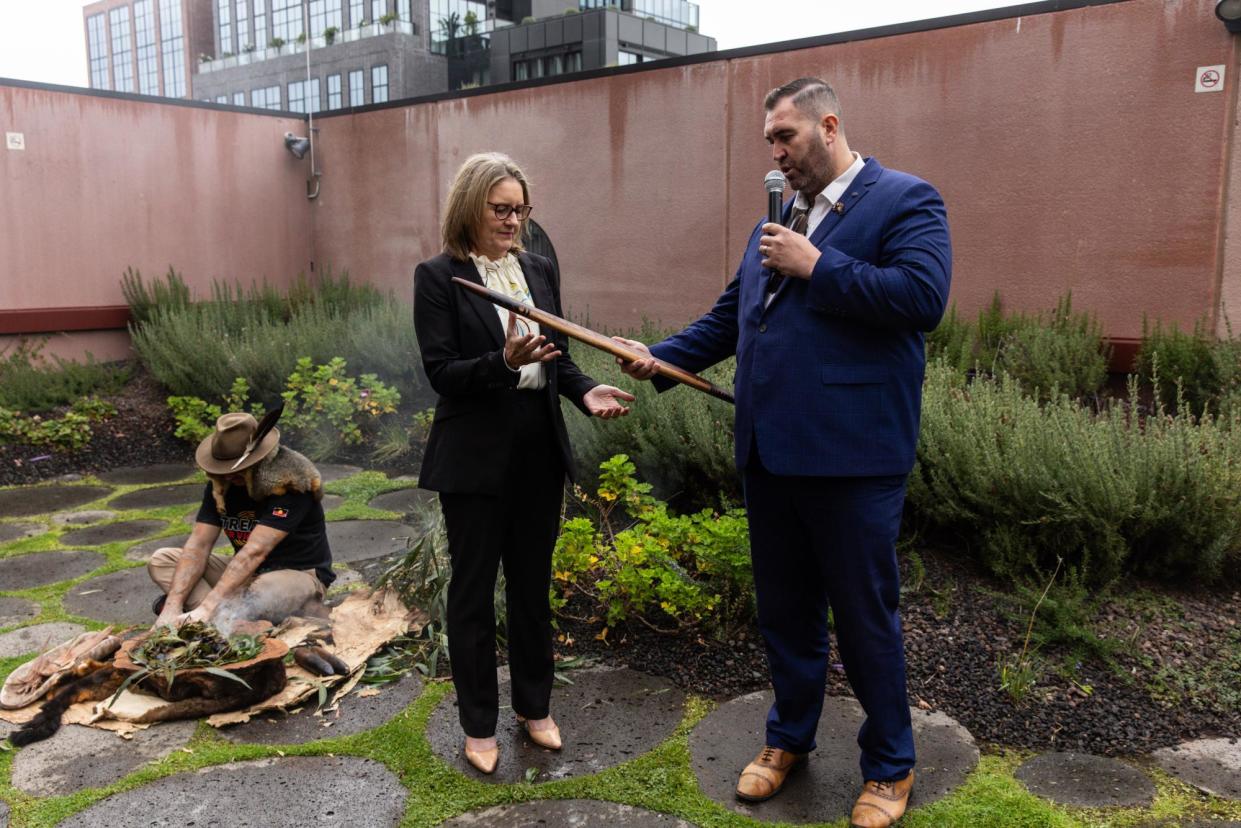Victorian premier confronts ‘bloody stains of colonisation’ at historic Indigenous truth-telling inquiry

The Victorian premier, Jacinta Allan, entered the Yoorrook Justice Commission’s hearing room on Monday holding a message stick bearing the names of the state’s Indigenous groups who have participated in the truth-telling process.
During a smoking ceremony ahead of the premier’s evidence, Travis Lovett, a deputy commissioner at the truth-telling inquiry and a Kerrupmara/Gunditjmara man, presented the premier with the message stick. He implored Allan to carry with her the stories of First Nations people who have put their “heart and soul” into the commission’s work.
Ahead of the hearing, as wisps of gum leaf smoke from a welcoming ceremony drifted into the Melbourne sky, Lovett summarised the significance of the premier’s appearance, saying “our people have been waiting nearly 200 years for this day”.
Allan did indeed make history on Monday, becoming Australia’s first state leader to provide evidence at a formal truth-telling inquiry, which has the same powers as a royal commission. Yoorrook’s process, modelled on international truth-telling inquiries, most notably post-Apartheid South Africa, is an Australian-first.
During the inquiry, which ran for more than three hours, Allan reaffirmed her government’s “unequivocal” commitment to a treaty with First Nations people in Victoria.
She acknowledged the state’s history had deliberately excluded the “bloody stains of colonisation” for too long. She stressed that while Victoria’s record of history was incomplete, it was not enough to “merely know this history”.
“We do need to learn from it, and we do need to act on it,” she told the commission.
Allan’s appearance was punctuated by somber moments. The premier spoke about what she had learnt about Victoria’s colonial past as she prepared for her appearance at the inquiry.
She recounted how she had sat in her back yard in Bendigo on Dja Dja Wurrung country, reading through material and feeling distressed that she had not known anything about historical massacres that had occurred not far from her own home.
“That distress carries with me today. It brings me a sense of shame and distress personally that I did not know that,” she said.
Allan was pressed by Lovett about her admission, considering Indigenous people have told these stories of brutality for centuries. Yet, Allan’s learning journey is one the wider Victorian public will need to embark on for Yoorrook to achieve its mandate of developing a “shared understanding” among all residents of the impact of systemic injustice suffered by First Nations people.
The premier, in sharing her story, highlighted the importance for all Victorians to commit to deepening their knowledge and understanding of what has occurred in the place they call home.
The commissioners throughout the inquiry implored Allan to ensure her words led to action and that reform was not delayed while a treaty process took place.
Prof Eleanor Bourke, Yoorrook chair, asked Allan to ensure she lived up to her words and action, noting First Nations people had faced decades of unfulfilled commitments and government inertia.
Allan said the treaty process would ensure the government was held accountable and help ensure Indigenous people were shielded from changing policies within political cycles. She gave hints about the reforms the government may be willing to pursue, although she repeatedly stressed she would not pre-empt treaty negotiations, which are due to begin later this year.
The premier flagged changes to how schools teach Victoria’s history, saying Yoorrook’s findings could be embedded in the curriculum to ensure all children learn about the state’s past and about the inequalities that persist today.
In a witness statement tendered to the commission, Allan also said she was prepared to deliver an apology to First Nations Victorians for injustices suffered due to government policies.
Allan says any apology would take place after the inquiry handed down its final report next year and would be negotiated with the First Peoples’ Assembly - the state’s democratically elected Indigenous body.
While an apology is not certain, the commission has made it clear the government’s commitment must extend beyond words.
As Bourke told the premier: “Your words will live on the public record for generations to come.”


